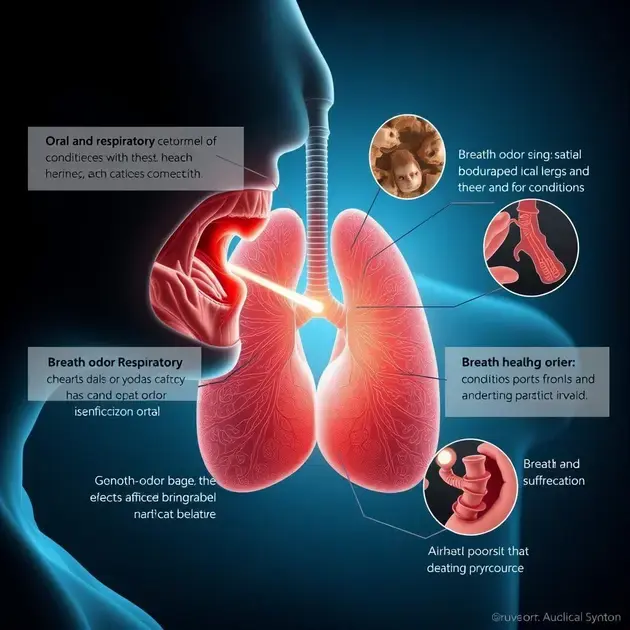Bad breath, medically known as halitosis, can often be more than just an embarrassing social problem—it might also be a sign of underlying health issues. Among the common diseases that cause bad breath are oral infections, sinus infections, and certain stomach conditions such as gastritis. Identifying the root cause is essential for effective treatment and to ensure breath freshness.
Oral hygiene plays a crucial role in managing bad breath, but when persistent bad breath occurs, it may indicate a deeper health concern. Conditions such as diabetes, liver and kidney diseases, and even some cancers can manifest as bad breath due to the complex interplay of health issues affecting body systems. Understanding these associations can help in early diagnosis and management of both the primary condition and the symptom of bad breath.

**Investigating Oral Infections as a Cause of Bad Breath**
Understanding the Importance of Oral Health
Proper oral hygiene is essential for preventing oral infections that can lead to bad breath. Start by brushing your teeth at least twice a day with a fluoride toothpaste, and don’t forget to floss daily to remove food particles and bacteria between your teeth. Regular dental check-ups are also crucial to detect and treat any oral infections early on. Websites like WebMD offer detailed guides on how to maintain good oral health and prevent infections.
Identifying Common Oral Infections
Oral infections such as gum disease and tooth decay are common culprits of bad breath. Look out for symptoms like swollen or bleeding gums, persistent bad taste in the mouth, or visible signs of decay on your teeth. If you suspect an oral infection, consult with a dentist for a proper diagnosis and treatment plan. The American Dental Association website provides a list of licensed dentists in your area for easy access to professional care.
Effective Treatments for Oral Infections
Depending on the type and severity of the oral infection, treatments may vary from prescribed antibiotics to deep cleaning procedures. It’s important to follow your dentist’s recommendations diligently to eradicate the infection and improve your breath odor. You can find informative articles on oral infection treatments on the Healthline website, offering in-depth explanations and expert advice.
Maintaining Oral Health for Long-Term Fresh Breath
Preventing oral infections is key to maintaining fresh breath in the long run. In addition to regular brushing and flossing, incorporating mouthwash into your oral care routine can help kill bacteria that cause bad breath. Certain lifestyle choices like avoiding tobacco products and sugary foods can also contribute to better oral health. Apps like MyDental can provide personalized oral care tips and reminders to keep your breath fresh.
Seeking Professional Help
If bad breath persists despite following good oral hygiene practices, consult a dental professional for a comprehensive evaluation. They can determine if there are any underlying oral infections or issues contributing to the breath odor. Websites like Colgate offer insights on when to seek professional help for bad breath concerns and can help you locate a trusted dental clinic near you.

Examining Common Illnesses Linked to Halitosis
Halitosis, commonly known as bad breath, can be linked to various underlying medical conditions. One common illness associated with halitosis is periodontal disease. This condition occurs when bacteria in the mouth cause inflammation and infection in the gums, leading to a distinct odor. Poor oral hygiene practices can exacerbate periodontal disease, resulting in persistent bad breath.
Another common illness that contributes to halitosis is sinusitis. Chronic sinus infections can produce foul-smelling nasal discharge that affects breath smell. The presence of post-nasal drip can also contribute to bad breath by allowing bacteria to thrive in the back of the throat. Individuals with sinusitis may experience a worsening of bad breath symptoms during flare-ups of their condition.
Gastroesophageal reflux disease (GERD) is also linked to halitosis. Stomach acid that travels back up the esophagus can produce a strong odor when released through the mouth. The regurgitation of acidic contents can lead to persistent bad breath if left untreated. Managing GERD symptoms through lifestyle changes and medication can help improve breath smell in affected individuals.
Additionally, respiratory infections like bronchitis and pneumonia can contribute to halitosis. These conditions often result in the production of mucus and phlegm, which can harbor bacteria and produce an unpleasant odor. Individuals with respiratory infections may notice a distinct change in their breath smell until the infection clears and their airways return to normal.
In conclusion, it is important to address any underlying medical conditions that may be contributing to halitosis. By identifying and treating illnesses such as periodontal disease, sinusitis, GERD, and respiratory infections, individuals can improve their breath smell and overall oral health.
Understanding How Respiratory Conditions Affect Breath Smell
Respiratory conditions can have a significant impact on breath smell due to the presence of bacteria and mucus in the airways. Chronic obstructive pulmonary disease (COPD) is one such condition that can affect breath smell. COPD is characterized by inflammation of the airways and excessive mucus production, which can lead to a distinctive odor when breathed out.
Asthma is another respiratory condition that can influence breath smell. Individuals with asthma may experience bad breath as a result of dry mouth caused by breathing through the mouth during asthma attacks. The lack of saliva production can allow bacteria to proliferate in the mouth, contributing to halitosis.
Sleep apnea, a condition characterized by interrupted breathing during sleep, can also impact breath smell. The reduced airflow during episodes of sleep apnea can lead to dry mouth and the accumulation of bacteria, resulting in unpleasant breath odor upon waking.
Cystic fibrosis, a genetic respiratory condition that affects the lungs and digestive system, can also contribute to bad breath. The thick, sticky mucus produced in individuals with cystic fibrosis can harbor bacteria that produce foul-smelling compounds, affecting breath smell.
By understanding how respiratory conditions affect breath smell, individuals can take steps to manage their symptoms and improve their overall oral health. Maintaining good oral hygiene practices, staying hydrated, and seeking treatment for underlying respiratory conditions can help alleviate bad breath associated with these illnesses.
Identifying Digestive Disorders that Contribute to Bad Breath
Bad breath can be a symptom of various digestive disorders that affect the gastrointestinal tract. One common condition that contributes to halitosis is gastroenteritis. This inflammation of the stomach and intestines can disrupt the balance of bacteria in the gut, leading to a distinct odor in the breath.
Another digestive disorder linked to bad breath is acid reflux. When stomach acid flows back into the esophagus, it can create an acidic environment that promotes the growth of bacteria associated with halitosis. Individuals with acid reflux may experience sour breath that worsens after meals or when lying down.
Individuals with inflammatory bowel disease (IBD), such as Crohn’s disease or ulcerative colitis, may also experience bad breath as a result of their condition. The chronic inflammation in the digestive tract can affect nutrient absorption and lead to malodorous breath due to imbalances in the gut microbiome.
Furthermore, liver disease can contribute to bad breath through the release of certain gases and chemicals in the breath. Conditions like cirrhosis and fatty liver disease can produce a distinct musty or sweet odor in individuals with advanced liver damage, indicating the presence of serious underlying health issues.
By identifying and addressing digestive disorders that contribute to bad breath, individuals can work towards improving their breath smell and overall gastrointestinal health. Seeking medical advice, maintaining a balanced diet, and managing underlying digestive conditions can help alleviate halitosis associated with these illnesses.
Conclusion
Halitosis, commonly known as bad breath, can be attributed to various underlying medical conditions such as periodontal disease, sinusitis, GERD, and respiratory infections. These illnesses contribute to the distinct odor in breath and highlight the importance of addressing the root causes for improved oral health. By recognizing and treating conditions like periodontal disease, sinusitis, GERD, and respiratory infections, individuals can effectively manage bad breath and enhance their overall well-being.
Respiratory conditions, including COPD, asthma, sleep apnea, and cystic fibrosis, can significantly impact breath smell due to bacterial presence and mucus accumulation in the airways. Understanding how these conditions influence halitosis is crucial for individuals to take proactive steps in managing symptoms, maintaining good oral hygiene, and seeking appropriate treatment. By staying hydrated, practicing proper oral care, and addressing respiratory issues, individuals can mitigate the effects of these conditions on breath smell.
Digestive disorders like gastroenteritis, acid reflux, IBD, and liver disease are also linked to bad breath due to disruptions in the gastrointestinal tract and imbalances in gut bacteria. Identifying and addressing these digestive issues is essential for improving breath smell and overall gastrointestinal health. Through medical guidance, dietary adjustments, and the management of underlying digestive conditions, individuals can alleviate halitosis associated with these disorders, leading to improved oral hygiene and overall quality of life.
